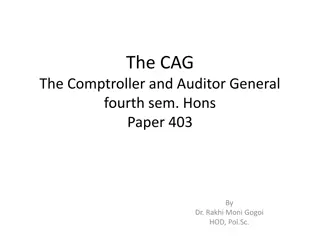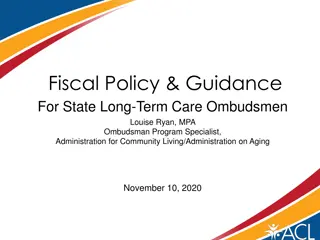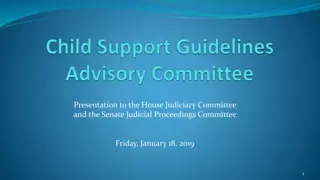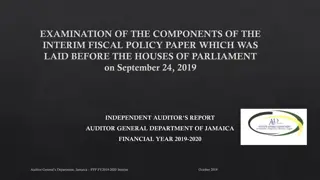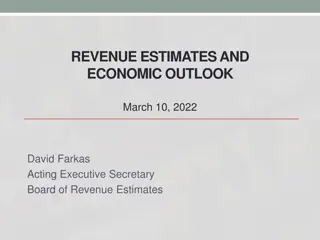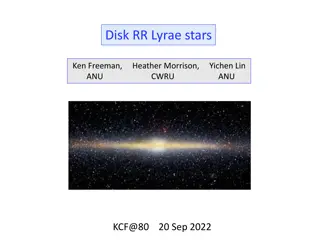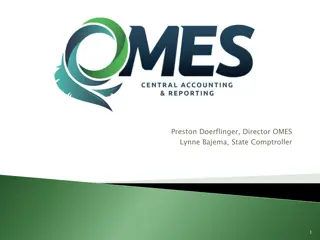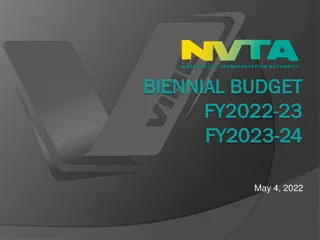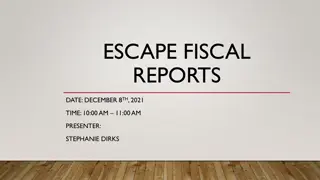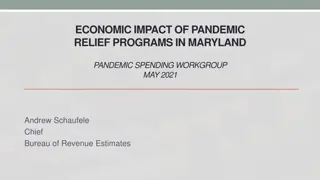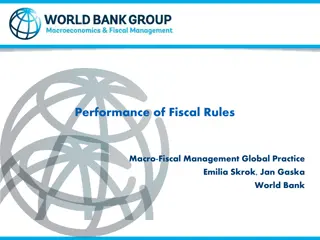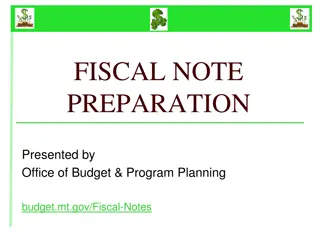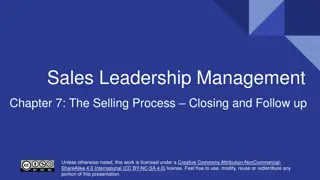FMIS.R*STARS Closing Fiscal Year 2021 - Comptroller of Maryland Guidelines
Guidelines from the Comptroller of Maryland for the FMIS.R*STARS closing of fiscal year 2021 include deadline dates, DBM requirements, payroll accruals, budget amendments, and cash/adjusting transactions. Agencies must adhere to specific instructions for fiscal year closure processes.
Download Presentation

Please find below an Image/Link to download the presentation.
The content on the website is provided AS IS for your information and personal use only. It may not be sold, licensed, or shared on other websites without obtaining consent from the author.If you encounter any issues during the download, it is possible that the publisher has removed the file from their server.
You are allowed to download the files provided on this website for personal or commercial use, subject to the condition that they are used lawfully. All files are the property of their respective owners.
The content on the website is provided AS IS for your information and personal use only. It may not be sold, licensed, or shared on other websites without obtaining consent from the author.
E N D
Presentation Transcript
FMIS R*STARS Closing Fiscal Year 2021 Comptroller of Maryland Peter Franchot General Accounting Division Sandra L. Zinck
GAD: FMIS R*STARS Closing Welcome Please review the following slides in conjunction with the annual closing instructions. 2
GAD: FMIS R*STARS Closing Deadline Dates The major deadline dates for the fiscal year budgetary closing process are shown. I. Payroll accruals are calculated by Central Payroll for all state agencies. However, if your agency prefers to calculate and post the payroll accruals instead, you need to advise the General Accounting Division in writing prior to June 1st. GAD will then exempt the Central Payroll Division s calculations from posting to R*STARS. II. Budget amendments June 15 Final budget amendments for the fiscal year must be submitted to the Department of Budget and Management by the date above. Please refer to DBM s manual for specific requirements related to these amendments. III. Cash/adjusting transactions July 15/23 Any cash or other adjusting transactions between your financial agency and other financial agencies should be completed on or before July 15th, or the next business day whenit falls on a weekend. Any cash or other adjusting transactions within your own financial agency should be completed on or before the date shown. IV. Close August 2 Budgetary closing documents must be submitted to GAD on or before the date above.3 Payroll accrual May 28
GAD: FMIS R*STARS Closing DBM Requirements For the fiscal year being closed, DBM requires financial agencies to meet with their analyst to review certain encumbrance balances as outlined in the annual closing instructions. Specifically, DBM will review all prior years encumbrances. They will also review current general and special fund encumbrances greater than $50,000. DBM will advise GAD of any disallowances which must be adjusted by the agency prior to final closing. Meet with DBM for encumbrance review. o o o Pay balance objects 0152 and 0154 to SERHWBF General Fund and Any Special and Higher Education Funds that do not retain funds at YE Certain appropriation balances remaining in objects 0152 (Employees Health Insurance) and 0154 (Retirees Health Insurance) must be expended by the agency and transferred to the State Employees and Retirees Health and Welfare Benefits Fund. Such cash adjusting entries are required for all general fund balances and any special fundbalances where specific legal authority does not existto retain those special funds. Also, DBM will advise Higher Education agencies of any balances required to be transferred. DBM will provide final estimates for the fiscal year being closed to state agencies for object 0305 and 0322 (telecommunication costs). These estimates should be recorded as accrued expenditures in the fiscal year ending June 30th. Accrue Objects 0305 & 0322 based on DBM estimates All budget amendments that have NOT been recorded by GAD in R*STARS by June 1st, must be identified on the Agency Closing to DBM form. This form must be submitted to DBM. All budget amendments listed on this form must be entered in R*STARS by the agency as budget amendments in process. The detail procedure for these entries will be provided later in this presentation. Submit Agency Closing to DBM form 4
GAD: FMIS R*STARS Closing R*STARS Closing Checklist One of the required Budgetary Closing documents is the R*STARS Closing Checklist. Detailed instructions are included in the Annual Closing Package. 5
GAD: FMIS R*STARS Closing IT File The Internal Transaction (IT) File is a file that processes all interfacing, manual, and generated transactions through R*STARS. This file stores transactions that identify errors and error-free transactions. While error-free transactions are in this file, they can be posted but are subject to change, having action codes appended to them, or subsequent generated transactions processed from them prior to being balanced and released. All transactions for the fiscal year being closed must be balanced and released from this file with the exception of Voucher Payable transactions where the due date on the transaction has not occurred. IT file transactions are identified on the 530 Batch Header Screen and the 520 Batch Detail Screen. Report available as well QAFR7230. 6
GAD: FMIS R*STARS Closing Budget Amendments Any budget amendments not posted by GAD by June 1stmust be posted by the agencies as Budget Amendments in Process in R*STARS and listed on the Agency Closing to DBM form. Each budget amendment must be listed separately. Provide net totals for each fund affected in a separate column Provide the total of each fund for all budget amendments. 7
GAD: FMIS R*STARS Closing Receivables/Payables All receivable and payable transactions recorded at year-end must be recorded in accordance with state policies which are documented in the annual closing instructions. 8
GAD: FMIS R*STARS Closing Appropriations Any appropriation balances remaining after all accounts payable and allowable encumbrances have been recorded will be reverted automatically by GAD at the end of the year.
GAD: FMIS R*STARS Closing GAAP Accounts Payable GAAP Payables are defined as those goods and services provided during the fiscal year ending June 30th which could not be recorded as part of budgetary closing due to a lack of appropriation authority. Such payables must be reported as a GAAP Payable to assure they are included in the State s GAAP financial report. 10
GAD: FMIS R*STARS Closing Fund Balances At the end of a fiscal year any special fund balances remaining for which the agency does not have legal authority to retain must be allocated by the agency to the general fund, or another fund if specified by legal authority. Allocations must be done prior to final closing. Fund balances that can be retained by state agencies due to legal authority must be identified and submitted on the G-8 form. 11
GAD: FMIS R*STARS Closing Fixed Assets All new fixed assets acquired during the fiscal year being closed must be recorded in the R*STARS Fixed Assets Subsystem based on an individual agency s threshold. 12
GAD: FMIS R*STARS Closing Negative Appropriations During the fiscal year, agencies can record encumbrances in excess of their unexpended appropriation balance. However, at year end, the unencumbered balance must be zero or a positive amount. Appropriations must not be negative. 13
GAD: FMIS R*STARS Closing Chargeback Clearing/Program 099 All cash balances in an agency s chargeback clearing accounts program 099 must be allocated to the proper accounts for the fiscal year being closed. 14
GAD: FMIS R*STARS Closing GAAP Trial Balance Agencies should review DAFR8580 (Balance Sheet) and DAFR8590 (Operating Statement) reports for significant variances between this year and the prior year. Agencies should research such variances for audit and for other disclosures. Are the variances reasonable based on fiscal year activity? 15
GAD: FMIS R*STARS Closing Submitted by Financial Agency The Closing Checklist, G-8 Form, and the Agency Closing to DBM form, must be submitted at the Financial Agency level only and not by units within a Financial Agency to the General Accounting Division. 16
GAD: FMIS R*STARS Closing GAD Form X-18 A GAD X-18 form for each financial agency must be on file. This may be submitted at the batch agency level. The Form X-18 provides contact information to GAD and is available on https://www.marylandtaxes.gov/state-agency- accounting/accounting-procedures.php https://www.marylandtaxes.gov/forms/state- accounting/static-files/APM/x-18_20160210.pdf The form should be sent to Megan Senior at GAD. That email address is GADCAFR@marylandtaxes.gov 17
GAD: FMIS R*STARS Closing GAD Form G-8 Form G-8, included as part of the R*STARS closing package, must be submitted by each financial agency in either of two cases. o If your agency has special funds which should be retained at year- end, these should be reported. Please cite the legal authority for retaining the fund balances for special funds. o If your agency has non-budgeted funds with a negative cash balance, report these funds and the justification for this balance. If applicable, these balances should be reported on the appropriate GAAP closing schedule to adjust the State s financial statements. 18
GAD: FMIS R*STARS Closing Receipts The effective date for cash received on or before June 30thwhich is being recorded after year-end is June 31st. Agencies have until July 7thto record cash received on or before June 30th . Cash collected July 1st or later should be recorded in the next fiscal year. 19
GAD: FMIS R*STARS Closing Chargebacks Chargeback (failed) deposits occurring on or before June 30th will be recorded by the Treasurer s Office with an effective date of June 31st. The State Treasurer s Office will debit/credit the chargeback account (Program 099) for all bank corrections. The agency should move the amount from the chargeback account to the account where the deposit was originally posted to zero balance the chargeback account at year-end. 20
GAD: FMIS R*STARS Closing Check Cancellation Check cancellations are recorded as of the effective date entered by the Treasurer s Office. Cancellations by June 30th are recorded as cash receipts of the fiscal year being closed. Cancellations may be accrued in the fiscal year being closed. 21
GAD: FMIS R*STARS Closing Transfers and Adjusting Entries An agency has until July 15 to record all transfers and adjusting entries affecting other financial agencies An agency has until July 23 to record all transfers and adjusting entries within their own agency. All transfers or adjusting entries made after June 30th should have an effective date of June 31st (month 13). 22
GAD: FMIS R*STARS Closing R*STARS Rollover Financial Accounts FY 2021 balances will rollover to FY 2022 after posting on June 30th. R*STARS expedite cycle will run at 11 AM and will close at normal time on June 30th R*STARS not be available July 1st R*STARS available on July 2nd, 3rd, 4th & 5th. Batch Cycle July 2nd. No batch cycle on July 3rd, 4th 5th.
GAD: FMIS R*STARS Closing Budget Amendments Budget amendments must be submitted to DBM by June 15 Agencies must record all Budget Amendments in process beginning June 1 Use T/C 027 to increase appropriation Decreases to appropriations should use T/C 027R 24
GAD: FMIS R*STARS Closing Budget Amendments in Process Agencies may view budget amendments in process on the 62 appropriation screen (balance type 04) Budget amendments must be approved by DBM. 25
GAD: FMIS R*STARS Closing Reversions of Appropriations Appropriations not authorized to be retained are automatically reverted. GAD will run a computer program after all agencies are closed to record all reversions. 26
GAD: FMIS R*STARS Closing Review DAFR 6000 & 5990 All agencies should review the DAFR 6000 and DAFR 5990 reports for overspent encumbered balances. o Check current and prior fiscal year appropriation balances. The DAFR 6000 has ALL appropriations, expenditures and encumbrances. The DAFR 5990 has ONLY over encumbered balances. o The system does not prevent agencies from over encumbering balances. 27
GAD: FMIS R*STARS Closing Special Revenue Fund Balances Agencies should transfer special revenue fund balances to the general fund that may not legally be retained. Use T/Codes 400 and 401 to transfer revenue to the general fund. o T/Code 400 debits cash and credits transfers in o T/Code 401 debits transfers out and credits cash. 28
GAD: FMIS R*STARS Closing Revenues Accounts receivable and accrued revenues at year-end should be recorded as stated in the closing package. Accrued revenue is similar to accounts receivable in which goods and services have been provided prior to July 1st, but a bill has not been sent or prepared by this date. 29
GAD: FMIS R*STARS Closing Federal, Reimbursable Funds Federal and reimbursable funds should be recorded per State policy. o These revenues should be recognized in the same year as the expenditures. o At year-end, the fund balance for these funds should be zero. For federal fund revenues, you may have either a federal accounts receivable or deferred revenue at year-end. o With an accounts receivable, the federal government owes you money. o For deferred revenue, you either have an advance or you owe the federal government money. 30
GAD: FMIS R*STARS Closing Accounts Receivable If an account receivable is established at year-end, no reversal will occur in the next year. If accrued revenues are recorded, an automatic reversal will occur. 31
GAD: FMIS R*STARS Closing Accrued Revenue Accrued revenue at year-end can be recorded in month 13 in R*STARS o Use T/C 801 which will debit accounts receivable and credit accrued revenue. o T/C 801 will automatically reverse in the next fiscal year o The reversal of T/C801 will have the same Annual Year as the accrual Year-end accrual and reversal T/Cs and document types are detailed in the closing package. Cash receipts will have the same AY as the accrual and reversal 32
GAD: FMIS R*STARS Closing Accrued Revenue/Accounts Receivable Reductions Reductions to accrued revenue/accounts receivable for uncollectible amounts should be recorded using T/Codes 113R or 456. o T/Code 113R debits revenue and credits accounts receivable o T/Code 456 debits revenue and credits allowance for doubtful accounts. Transfers to CCU should be written off or recorded as doubtful accounts. Revenues not collectible within 60 days of year-end should be deferred in R*STARS. 33
GAD: FMIS R*STARS Closing Record Long-Term A/R & Defer Uncollected Revenue Accounts receivable expected to be received after 60 days should be recorded as long-term accounts receivable and deferred revenue. If accounts receivable was previously recorded, use T/Codes 824 and 807. o T/Code 824 debits long-term accounts receivable and credits year- end accounts receivable o T/Code 807 debits revenue and credits deferred revenue. If accounts receivable is not already recorded, use T/Code 825 to debit long-term accounts receivable and credit deferred revenue. T/Codes will reverse in the next year. 34
GAD: FMIS R*STARS Closing Investment Accruals If your agency owns investments retained by the State Treasurer, the year-end interest accrual will be recorded by GAD and automatically reversed in the new fiscal year. If your agency has cash pooled with the State Treasurer, the interest allocation will be recorded by the Treasurer s Office. 35
GAD: FMIS R*STARS Closing Accounts Payable At the end of the fiscal year, all accounts payable and accrued expenditures should be recorded in R*STARS. Accounts payable are based on invoices received for goods or services received on or before June 30th. Accrued expenditures are recorded for goods or services received by June 30th for which no invoice has been received. Record year-end accounts payable and accrued expenditures with an effective date of June 31st. Agencies have until August 16 to record expenditures for capital projects in R*STARS. o If you have payments for capital projects in excess of $100,000 after this date or after your closing, contact GAD so we can include any such invoices in the State s financial statements. 36
GAD: FMIS R*STARS Closing Order of Recording Appropriated Balances The order of recording appropriated balances is as follows: o Accounts Payable o Accrued Expenditures o Encumbrances Therefore, if you have accounts payable in excess of your appropriated balance, you cannot record encumbrances. 37
GAD: FMIS R*STARS Closing Accrued Expenditures Accrued expenditures should be recorded using T/Codes 803 or 809. o T/Code 803 debits accrued expenditures and credits year-end accounts payable o T/Code 809 debits accrued expenditures and credits year-end accounts payable with encumbrance adjustments. The reversal will be made to the same Accounting Year. If you do not expect payment to be made until a year or more after year-end, reclassify accounts payable to a long- term payable using T/Code 827. o T/Code 827 debits year-end accounts payable and credits accounts payable long-term. o All journal entries will reverse the following year. 38
GAD: FMIS R*STARS Closing Payroll Accruals Your agency has three options for accruing payroll: 1. Central Payroll Bureau (CPB) accrues payroll 2. CPB accrues payroll and agency does adjusting entries 3. Agency does own accrual: Notify GAD by May 28 if intend to do your own accrual 39
GAD: FMIS R*STARS Closing Payroll Accruals- Regular Pay Central Payroll Bureau will accrue the regular payroll. The regular payroll for the Pay Period Ending 6/15 will be disbursed in the fiscal year being closed. The regular payroll for the Pay Period Ending 6/29 will be disbursed in the next fiscal year. CPB Accrual Regular Accrue 15/14 days X PPE 6/01 payroll Regular PPE 6/15 disbursed in fiscal year being closed Regular PPE 6/29 disbursed in next fiscal year 40
GAD: FMIS R*STARS Closing Payroll Accruals (cont d) CPB will accrue the contractual payroll as shown on the slide. The contractual payroll for PPE shown will be disbursed in the fiscal year being closed. o The contractual payroll for the next PPE will be disbursed in the next fiscal year. Contractual Accrue 8/14 days X PPE 6/08 payroll Contractual PPE 6/22 disbursed in fiscal year being closed Contractual PPE 6/23 & 7/06 disbursed in next fiscal year 41
GAD: FMIS R*STARS Closing Payroll Accruals (cont d) All accruals and reversals post to salaries and fringe benefits payable. All reversals and disbursements in the new fiscal year will be reflected in the next Appropriation Year. 42
GAD: FMIS R*STARS Closing Compensated Absences At year-end, all agencies should accrue leave payouts made in July for all employees that ended employment at the end of the fiscal year. Agencies should use T/Code 805, which debits expenditures and credits salaries and fringe benefits payable. o T/Code 805 will reverse in the next AY. 43
GAD: FMIS R*STARS Closing Encumbrances During the fiscal year, differences between ADPICS and R*STARS may occur. Now is the time to correct those differences. Do not wait until the end of the fiscal year. To identify differences between the 2 systems, compare encumbrance balances in the ADPICS open Purchase Order report to the R*STARS encumbrance status reports DAFR6320 or DAFR6050. 44
GAD: FMIS R*STARS Closing Encumbrances Agencies must adjust their year end encumbrance balances for any disapprovals made by DBM and any changes required under the Encumbrance policy stated on pages 1-53 and 1-54 of the annual closing instructions. Agencies have the option to adjust their encumbrance balances at fiscal year end at the General Ledger level onlywithout changing their individual encumbrance document balances. o This can be done by using TCode 804R to reduce their encumbrance balance. o It may be necessary to adjust the document level balances in the new fiscal year. All final encumbrance balances at the end of the fiscal year must be reviewed and approved by DBM. 45
GAD: FMIS R*STARS Closing Fixed Assets All new fixed assets that meet the agency s threshold for recording fixed assets must be entered in the R*STARS Fixed Assets Subsystem. o The data in the subsystem will update the R*STARS General Ledger Accounts for fixed assets. To reconcile balances between the subsystem and the general ledger, o Compare the Subsystem DAFR8190 detail report or the DAFR8110 totals report to the R*STARS DAFRG100 General Ledger report. 46
GAD: FMIS R*STARS Closing General Ledger Accounts General Ledger 0811 (Land Improvements) General Ledger 0812 (Art & Historical Treasures) General Ledger 0813 (Structures & Improvements) General Ledger 0814 (Infrastructure) General Ledger 0815 (Equipment) General Ledger 0817 (Construction in Progress) General Ledger 3015 (Investments in Fixed Assets) o contra general ledger account for all of the fixed assets general ledger account classifications. 47
GAD: FMIS R*STARS Closing Depreciation Disposals/Trade in Donations Software Capitalization When entering fixed assets data into the R*STARS Subsystem, you must take into account any depreciation, disposals, or trade ins. Record fixed asset data for any donated assets, or software capitalizations that may have occurred. 48
GAD: FMIS R*STARS Closing Capital Leases All capital leases for equipment must be entered using acquisition method #5. Enter the entire principal amount. Applies to capital leases managed by STO or by your agency.
GAD: FMIS R*STARS Closing Capital Projects Capital Projects expenditures resulting in a fixed asset to the State must be entered into the Fixed Assets subsystem in R*STARS. o Includes any capital project expenditures made by the Department of General Services on your agency s behalf. o Must be done prior to certifying the R*STARS closing checklist. o If you are subsequently notified of capital expenditures resulting in fixed assets made through DGS, you should continue to enter them in the subsystem until your agency is closed by GAD. 50



